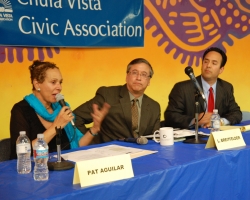
Candidates for Chula Vista City Council met for a community forum on Monday, taking questions from voters and local community groups.
The forum had been expected to include conservative radio host Roger Hedgecock as moderator, but he did not to attend after objections from the MAAC foundation, which hosted the event.
Council candidates Patricia Aguilar, Larry Breitfelder and Humberto Peraza found common ground on many of the issues facing the city.
All three candidates agreed that Chula Vista needs more high paying jobs, a more streamlined process for business license applications, and all three advocated taking a wait-and-see attitude on medical marijuana dispensaries in the city.
Candidates were asked what immediate steps they would take to attract jobs to the city, as opposed to the common refrain that focuses on long-term goals, like a university park and bay front development.
Aguilar said she believed the city should be focused on the medical sector, noting the two large hospitals in town and saying the medical industry was a “natural” focal point for the city.
“This is our solution for the city … we can become known as the healthcare center of the South Bay,” Aguilar said.
Breitfelder said the city needed to do a better job of recruiting business interests to Chula Vista, saying it was time to “put people on planes” and sell the area to investors regionally and beyond.
Peraza said bluntly that “there are no short-term fixes,” saying mismanagement over the years had set the city back in business development and it would take time to correct the problems.
Peraza said the city’s permitting process needed urgent attention to eliminate bureaucratic hurdles, something each of the other candidates also emphasized.
On the issue of medical marijuana, each candidate took a non-committal stance, acknowledging that medical marijuana is the law of the land, but expressing concerns of how it should be handled in the city limits.
Chula Vista currently has a moratorium on the establishment of dispensaries, and city leaders say they are trying to define appropriate regulations, like where dispensaries will be located in relation to schools and other sensitive sites. Peraza summed up the mood of the panel.
“Medical marijuana is state law and I support the state law… we just have to figure out how we’re going to define it in Chula Vista,” Peraza said.
He said care needed to be taken to site dispensaries appropriately, if they are allowed at all.
All candidates left open the possibility of blanket prohibition on dispensaries in Chula Vista; other cities have enacted permanent bans and the matter is currently in litigation.
Candidates began to show some daylight between them when asked if they would support a law requiring lobbyists in the city to register. Aguilar expressed her views plainly.
“Obviously, everyone who lobbies a city council member should be required to register … we should have done that a long time ago,” said Aguilar.
Peraza said there needed to be better access to reports and disclosures for lobbyists and candidates, but stopped short of endorsing a registry requirement.
Breitfelder said he was “all for forcing registration of lobbyists” but said people shouldn’t expect that such registration would have a significant effect on the process.
“Registering lobbyists has the same problem as regulating ethics … our expectations of that have to be limited. Our best defense is to have people with some integrity coming through the door,” said Breitfelder.
The panel had significant disagreement over upcoming ballot initiative Prop. G, which would bar the city from entering into project labor agreements on development initiatives it funds.
PLAs, as they are known, prohibit city funds from going to non-union contractors. Larry Breitfelder, who had been instrumental in getting Prop. G on the ballot, found himself on the outs as both of his opponents spoke against the measure.
Two mayoral candidates, Jorge Dominguez and incumbent Cheryl Cox, did not attend the event. Cox said she had been told the event was cancelled.
Councilman Steve Castaneda, who is also vying for the mayoral spot, was there.
He spoke out against a controversial proposal to expand redevelopment areas into the city’s residential zones.
Redevelopment zones can provide revenue for infrastructure improvements in specific neighborhoods, but critics say they deny cities badly needed general purpose funding.
Castaneda said the redevelopment agency has not shown positive results so far, and so he is reluctant to give them greater power or financial resources.
“I still have not seen one shred of proof that we’re going to make good on the promises we made (with other redevelopment plans),” Castaneda said.














